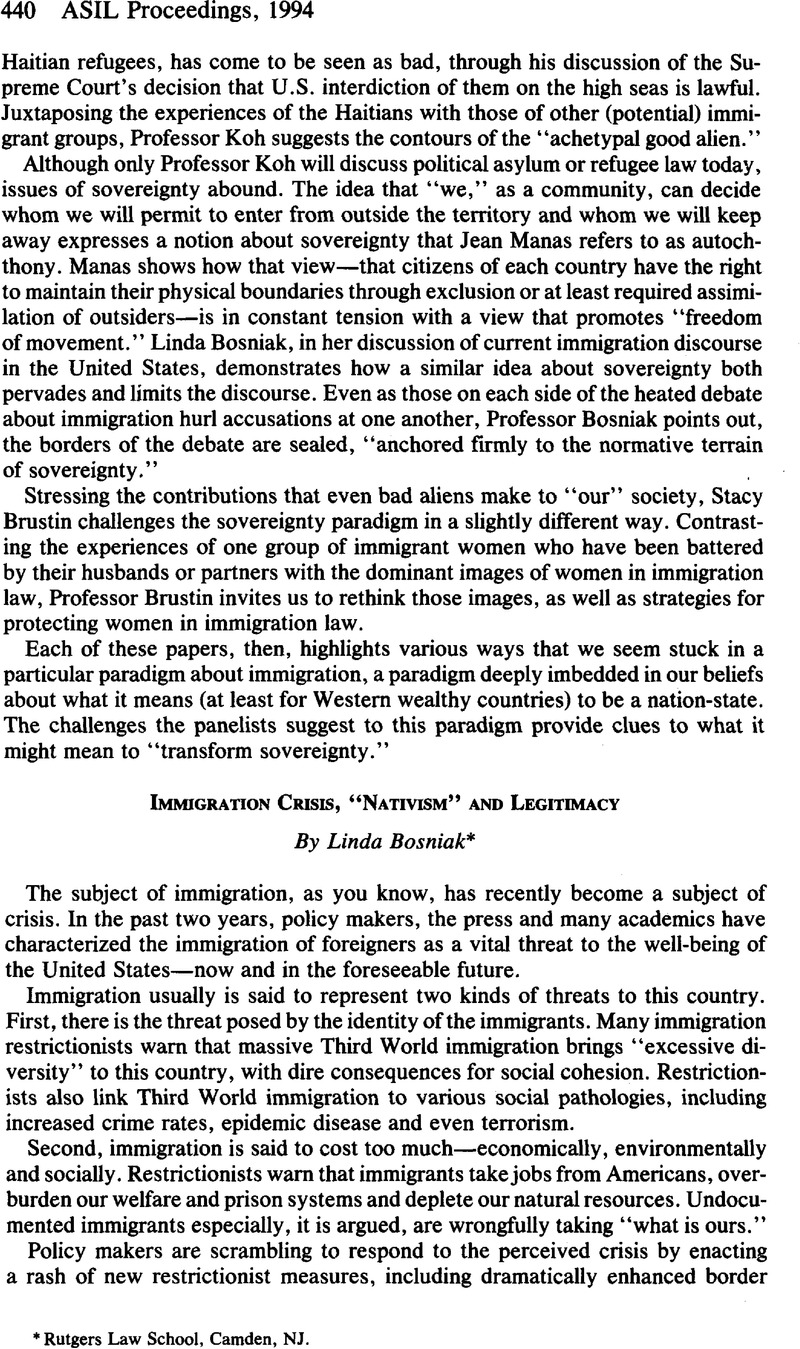Article contents
Immigration Crisis, “Nativism” and Legitimacy
Published online by Cambridge University Press: 28 February 2017
Abstract

- Type
- Immigration Politics and Sovereignty: National Responses to "Bad" Aliens
- Information
- Copyright
- Copyright © American Society of International Law 1994
References
1 Niebuhr, Gustav, Catholic Bishops Condemn Hostility to Immigrants , Wash. Post , NOV. 17, 1993, at A3 Google Scholar.
2 Cuomo, Mario, Immigration IS Our Source of Strength , USA Today , July 19, 1993, at 11A Google Scholar.
2 Goldsborough, James O., Targeting Immigration: Cultural Identity Concerns Fuel Anti-Immigrant Ire Worldwide , San Diego Trib. , April 5, 1993, at B5 Google Scholar.
4 See, e.g., NEWSWEEK, Aug. 9,1993, at 19; see also Kondracke, Morton, Immigration to Be Demagogues’ Next Issue After Nafta, Roll Call , Nov. 18, 1993 Google Scholar.
5 See, e.g., Beck, Roy, Challenging Immigration Fatalism , in 2 The Social Contract 73 , Winter 1991-1992 (“intimidation”)Google Scholar; Graham, Otis L. Jr., The Wind Has Shifted: A New Agenda for Immigration Reformers, Id. at 93 (“motive assassination”)Google Scholar; see also Nelson, Alan C., A Governor’s Brave Stand on Illegal Aliens , N. Y. Times , Aug. 23, 1993. (“Gov. Pete Wilson of California recently made reasonable recommendations for Federal Action to help stem the flow of illegal immigration to the U.S. His critics tried to derail the discussion by denouncing his plans as nativist and insensitive.”)Google Scholar
6 See Cohen, Anthony P., The Symbolic Construction Of Community 14 (1985) (describing the way normative symbolism is commonly embedded in certain words: "Philosophers have long since drawn our attention to the capacity of language to express attitude as well as to denote object. . . . [For example,] words such as ‘freedom’ or ‘democracy’ do not merely describe forms of government and legal status. They also tell us how to regard these forms. They are ‘hurrah’ words as opposed to ‘boo’ words”) (citations omitted)CrossRefGoogle Scholar.
7 Dinnerstein, Leonard, Nichols, Roger L. Reimers, David M., Natives And Strangers: Blacks, Indians And Immigrants In America 62 (2d ed., 1990)Google Scholar.
8 See, e.g., Smith, Rogers M., The “American Creed” and American Identity: The Limits of Liberal Citizenship in the United States , 41 W. Pol. Q. 225, 228 (1988) (describing “nativism,” as “ethnocultural Americanism .... at its extreme”)Google Scholar; Perea, Juan, Demography and Distrust , 77 Minn. L. Rev. 269, 278 (1992)Google Scholar; Karst, Kenneth L., Paths to Belonging: The Constitution and Cultural Identity , 64 N. C. L. Rev. 303, 304 (1986)Google Scholar.
9 Here, “nativism’s” referent is immigrants’ perceived disloyalty or dangerousness by virtue of their “un-Americanism.” The “Red Scare” of the 1920s, and aspects of McCarthy-era immigration policy, have each been described as nativist in character. See generally Preston, William Jr., Aliens And Dissenters (1963)Google Scholar; Martin Lipset, Seymour Raab, EARL, The Politics Of Unreason (1970). This usage is far less common today, although it has recently re-emerged in response to the current widespread association of aliens with terrorist violenceGoogle Scholar. See, e.g., Cole, David, The Scapegoats , NATION , July 26-Aug. 2, 1993, at 125 (describing widespread association of Arab immigrants with terrorism as “nativist paranoia”)Google Scholar.
10 See generally Higham, John, Strangers In The Land (2d ed. 1988)Google Scholar.
11 This Week With David Brinkley (ABC News television broadcast, Dec. 8, 1991). “I think God made all people good, but if we had to take a million immigrants in, say, Zulus, next year, or Englishmen, and put them in Virginia, which group would be easier to assimiliate and would cause less problems for the people of Virginia? There is nothing wrong with us sitting down and arguing that issue, that we are a European country.”)
12 Act of Oct. 3, 1965, Pub. L. No. 89-236, 79 Stat. 911.
13 See Ong Hing, Bill, Beyond the Rhetoric of Assimilation and Cultural Pluralism: Addressing the Tension of Separatism and Conflict in an Immigration-Driven Multiracial Society , 81 CAL. L. REV. 863, 871 (1993)Google Scholar.
14 Id. at 875; see also Kiss, Elizabeth, Is Nationalism Compatible With Human Rights? , paper presented at Conference on the Paradoxes of Rights, Amherst College, Nov. 1992, at 20. (On file at Amherst College, Dept. of Law, Jurisprudence and Social Thought.)Google Scholar
15 Shue, Henry, Basic Rights: Subsistence, Affluence, And U.S. Foreign Policy 131-32 (1980)Google Scholar.
16 See, e.g., Carens, Joseph, Migration and Morality: A Liberal Egalitarian Perspective , in Brian Barry & Robert E. Goodin. Free Movement 25, 28–31, 36-38 (1992)Google Scholar.
- 2
- Cited by




